Unfiltered Conversations with the Free Speech Union
All the interviews, discussions and debates organised by the Free Speech Union can now be enjoyed as audio podcasts. Browse through our back-catalogue of conversations with notable guests such as Douglas Murray, Kathleen Stock, Jack Dee and more. If you want to attend future conversations and discussions in person, join the FSU today.
Episodes
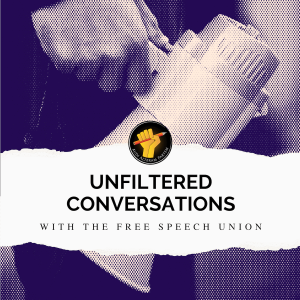
Wednesday Apr 02, 2025
Wednesday Apr 02, 2025
Join the Free Speech Union here:https://freespeechunion.org/join/
Wednesday 19th March, 2025Free Speech Union in partnership with Faith to FaithlessSpeakersTerri O'Sullivan , Apostate Services Development Officer for Faith to Faithless, a service of Humanists UK which supports people who have left high-control religious groupsKhadija Khan is a journalist and broadcaster. She is an editor at Canadian Magazine A Further Inquiry and a co-host of A Further Inquiry podcast.Dr Benjamin Jones is the Director of Case Management at the Free Speech Union and completed his PhD on the experiences of ex-Muslims in Britain.This event focused on the experiences of individuals who leave high-control religions or cults — whether they are ex-Muslims, ex-Jehovah’s Witnesses, ex-Evangelicals, ex-Mormons, ex-Scientologists, or have left an Ultra Orthodox Jewish sect. Leaving a religion can be a complicated, challenging and dangerous process. Apostates can be shunned and sometimes completely disowned from immediate family, relatives, and the community at large. The right to not believe is a fundamental human right and yet apostates can often experience real threats to their rights of freedom of speech, belief and association, and some will be subject to violence.The protections needed by apostates are under threat in myriad ways: the proliferation of loosely drafted hate speech laws in western countries, calls to end online anonymity — a much-needed protection for apostates to communicate with others outside their community, and unthinking algorithmic censorship of social media platforms. The Free Speech Union is especially concerned by the most dangerous threat on the horizon for ex-Muslims (and many other people besides) in the definition of 'Islamophobia' being advanced by the All-Party Parliamentary Group (APPG) on British Muslims. This definition, among other things, brands as Islamophobic anyone who makes "mendacious, dehumanizing, demonizing, or stereotypical allegations about Muslims". This could lead to apostates being even less free to tell their stories.The Free Speech Union hosted this event in partnership with *Faith to Faithless*, a groundbreaking support service run by Humanists UK that includes a helpline dedicated to supporting people who have left high-control religious groups. The helpline, operating three days a week and staffed by trained volunteers, offers bespoke assistance, resources, and empathetic support to a diverse group, including ex-Muslims, ex-Jehovah’s Witnesses, ex-evangelicals, and ex-Mormons. It aims to bridge the gap in understanding and support for apostates, providing a crucial lifeline for those navigating the complexities of leaving high-control religious environments.

Tuesday Feb 18, 2025
Tuesday Feb 18, 2025
Click here to join the Free Speech Union: https://freespeechunion.org/join/ WEDNESDAY 12th FEBRUARY, 2025THE BIG BILL OF RIGHTS DEBATE: A UK Bill of Rights Would Not Protect Free SpeechWith Professor JAMES ALLAN and PRESTON BYRNEIs it time to argue for a British Bill of Rights that could enshrine free speech and freedom of expression in law in a more robust way?Many free speech enthusiasts envy the USA’s First Amendment. Passed in 1791, this foundation stone of the Constitution enshrines as a ‘primary value’ that ‘Congress shall make no law… abridging the freedom of speech or of the press’. This simple clarity has acquired great historical and patriotic significance and those concerned about Britain’s free speech crisis often crave such a foundational protection against each new encroachment on our right to free expression.However, there are plenty of sceptics who argue that constitutional reform over here would not shore up the defence of free speech. Rather, they argue, we should reinforce the principles of English common law whereby that which is not expressly illegal, is a freedom to be enjoyed by each individual. Giving greater power to judges, lawyers and courts, they say, is disempowering of us, the demos.The Free Speech Union brought together two opposing speakers to bring this vital debate to life.One of our provocative debaters, Professor James Allan of Queensland University, says no, we cannot trust lawyers and judges to protect our fundamental freedoms -- in a healthy democracy, social conflicts and competing ideas need to be thrashed out in the political arena.In the opposing corner was Preston Byrne. Preston has advised Internet and social media companies on global free speech and censorship issues since 2018 and argues that the time is right to introduce a US-style First Amendment into UK law. ABOUT THE SPEAKERSJames Allan is Garrick Professor of Law at The University of Queensland, with special interest in legal and moral philosophy, constitutional law and bills of rights. He has previously taught in New Zealand, the USA and Hong Kong, but was born in Canada and practised law in Toronto and in London. Professor Allan he is opposed to bills of rights and has been actively involved in the efforts trying to stop one from being enacted in Australia. He sets out his stall in his latest book, The age of foolishness: a doubter's guide to constitutionalism in a modern democracy (published 2022). He also writes for The Australian, The Spectator Australia, Quadrant and the Daily Sceptic.Preston Byrne is a Senior Fellow of the Adam Smith Institute, Adjunct Professor at Fordham Law School and Managing Partner of Byrne & Storm, P.C. He has advised Internet and social media companies on global free speech and censorship issues since 2018. In 2020, he wrote a paper for the Adam Smith Institute, Sense and Sensitivity: Restoring Free Speech in the United Kingdom, and a draft law, the UK Free Speech Act, which would create a First Amendment-style free speech right for the UK. He is dual-qualified in England and the United States.

Thursday Dec 12, 2024
Thursday Dec 12, 2024
Recorded July 2024
To join the FSU please visit: https://freespeechunion.org/join/
Tavistock GIDS whistleblowers Sue Evans and Dr David Bell are joined by Prof. Michele Moore, Dr Michael Biggs and Stephanie Davies-Arai to reveal the shocking story of how the care of children was sacrificed to ideology.When the Cass Report was published in April 2024, it was immediately recognised in the UK and abroad as a game-changing intervention in the debate over the treatment of children who express confusion about their gender. Led by eminent paediatrician Dr Hilary Cass, the systematic review was the most extensive and thoroughgoing assessment ever undertaken of the ‘transgender care’ pathway provided by the Tavistock and Portman Trust’s NHS-funded Gender Identity Development Service (GIDS). Devastatingly, Dr Cass and her team concluded that there was no robust evidence base for the ‘affirmative’ treatment thousands of children and young people have received, including the prescribing of ‘puberty blockers’ and cross-sex hormones.The exposure of this medical scandal was fought for, long and hard, by many who suffered for their commitment to medical ethics and safeguarding children. The first member of staff to raise concerns about treatment at the Tavistock Clinic was Sue Evans back in 2005, but she, and others after her, experienced serious attempts to silence them within the clinic, across related professional bodies, in universities, publishing, the media and public life.The Free Speech Union was honoured to bring together an expert panel, including whistleblowere Sue Evans and Dr David Bell from the Tavistock Clinic, who risked their careers and much more to pursue the truth. This is a unique opportunity for us to learn the lessons from the Cass Report and the Tavistock scandal: that open inquiry and freedom of speech are essential to protecting us from pernicious ideas.
About the Speakers
Sue Evans was a state registered nurse and psychiatric nurse and has worked in many areas of mental health. She was a Senior Clinical Lecturer at the Tavistock Clinic and during her employment there, she spent a period of years working in the Gender Identity Development Service (GIDS).
Dr Michael Biggs was the first to discover the experiment with puberty blockers conducted by GIDS and the first to publish its unfavourable results. His research on endocrinological interventions on children and adolescents who identify as transgender has been published in Archives of Sexual Behavior, Journal of Sex and Marital Therapy, Journal of Pediatric Endocrinology and Metabolism, and Journal of Sexual Medicine, and in two edited volumes: Inventing Transgender Children and Young People and Sex and Gender: A Contemporary Reader. He acted as an expert witness in the case of Keira Bell and Mrs A. versus Tavistock NHS Trust (2020) at the High Court of England and Wales, for a case in the Australian Family Court, and for Dekker et al. v. Weida et al. in the U.S. District Court for the Northern District of Florida. He is Associate Professor of Sociology and Fellow of St Cross College, University of Oxford. Dr David Bell is a past president of the British Psychoanalytic Society and worked at the Tavistock Clinic as a psychiatrist and psychoanalyst for more than 25 years. In his role as Staff Governor, David was approached by clinicians who were working or had worked within GIDS, raising very serious concerns about its approach and in 2018 he wrote a report to convey these concerns to Tavistock management but they responded by instituting proceedings against him. Dr Bell’s persistence in working alongside other whistleblowers to force a change in approach, eventually led to the Cass Review. He is also a leading psychiatric expert in immigration/human rights. Stephanie Davies-Arai is the founder and director of Transgender Trend, the leading UK organisation calling for evidence-based healthcare for gender dysphoric children and young people as well as fact-based teaching in schools. Stephanie was an intervener in the High Court in support of Keira Bell and Mrs A, who brought a landmark case against GIDS in a claim that under-18s are not old enough to consent to treatment with puberty blockers and cross-sex hormones. Professor Michele Moore has worked internationally for more than 30 years, building research-led expertise to support inclusive education and communities. She is the co-editor, with Heather Brunskell-Evans, of two books which first raised concerns about gender ideology and medicine that are at the heart of the Cass Review: Transgender Children and Young People: Born in Your Own Body which the Tavistock wanted banned from its library, followed by Inventing Transgender Children and Young People which the Tavistock tried to block with threatened legal action. Because of the concerns she raises about the treatment of children experiencing gender confusion, she has been the target of vicious campaigns by activists for the last ten years.

Tuesday Nov 26, 2024
Tuesday Nov 26, 2024
Recorded 4th September 2024
The Free Speech Union brings together an emergency panel of speakers to discuss the government’s response to the August riots.
General Secretary of the Free Speech Union, Toby Young is joined by Mark Johnson of free speech and privacy campaign group Big Brother Watch, Tom Slater of online magazine Spiked and barrister George Thomas, an expert in the policing of public order.

Thursday Nov 14, 2024
Thursday Nov 14, 2024
Please support The Free Speech Union. You can become a member at https://freespeechunion.org/join/. You can donate at https://freespeechunion.org/donate/.
Saturday 19th October, 2024 Part of the Battle of Ideas Festival Speakers: Bryn Harris, Michelle Shipworth, Helen Joyce, Graham Stringer MP, Akua Reindorf KC, Chair: Jan Macvarish
Only three weeks after taking office, Labour Education Secretary Bridget Phillipson quietly kiboshed the protections for free speech promised by the Higher Education (Freedom of Speech) Act. If implemented, this much-debated legislation – that eventually achieved cross-party support – would have given sharper teeth to universities’ existing free speech duties. HE institutions would become dutybound to actively promote free speech on campus and academics, students and visiting speakers would gain recourse to the law should they have invitations to speak on campuses overturned. A ‘free speech czar’ within the Office for Students was to be granted powers to investigate breaches of these free speech protections. All this has been thrown up in the air with the announcement that the Act has been ‘paused’ and may well be repealed. The Free Speech Union has threatened the government with Judicial Review, claiming that overturning legislation by ministerial fiat is unlawful. We must wait to see if this forces the government to account for its decision – and even creates the impetus for the Act to be implemented. But what should we make of the decision to renege on a democratically established law to pursue free speech in universities? One stated reason for halting the act was relieving universities of a ‘burdensome’ duty to protect free speech. As even supporters of the law change were concerned at it being reduced to an overly bureaucratic time-consuming exercise by half-hearted Vice chancellors and administrators, does this objection ring true? Announcing the act would be paused, Phillipson said that if continued it would ‘expose students to harm and appalling hate speech on campuses’. How can we counter that point given that the legislation was designed to work within existing law on hate and harms, which themselves are often subjective and contested categories. Was it only a matter of time before the free speech act unravelled, leading to tit for tat accusations of harm and hate and endless lawfare? More sinisterly, some say that in the context of many universities struggling financially, powerful college managements successfully lobbied Government to protect partnerships with countries like China, which are hostile to free speech and require appeasing in order to secure overseas campus developments, lucrative research partnerships and permissions to send international students to the UK. Is free speech on campus being sacrificed to create cosy relationships with authoritarian regimes? Regardless, while few believed the free speech law by itself would turn the tide of cancellations, conformity and intolerance that has plagued academic life, the political push for intellectual openness alerted many to the free speech crisis in UK universities. How can this momentum be built upon further? What now for those who are concerned about securing intellectual diversity and heterogeneous opinion on campus?

Tuesday Nov 12, 2024
Tuesday Nov 12, 2024
Please support The Free Speech Union. You can become a member at https://freespeechunion.org/join/. You can donate at https://freespeechunion.org/donate/.
Monday 4th November 2024
The Bar Standards Board (BSB) has launched a public consultation on new rules to promote equality, diversity and inclusion (EDI) at the Bar. If adopted, barristers would be obliged to ‘act in a way that advances equality, diversity, and inclusion’ when providing legal services and the BSB would assume what it describes as an ‘outcomes focused’ approach to equality. The Free Speech Union hosted a panel of eminent legal experts to grapple with the merits of the Bar Standards Board's proposals. While ‘equality’, ‘diversity’ and ‘inclusion’ appear to be concepts worthy of general support, there is still much to debate about what they mean and whether ‘EDI’ is an appropriate framework for the governance of institutions and professions. Concerned barristers discuss the consequences of changing the core duty that they ‘should not unlawfully discriminate’ to a positive duty to advance a set of values that are highly contested. When similar EDI initiatives have been considered elsewhere, they have been challenged on the grounds that they risk introducing compelled speech and thought.
SPEAKERS:
Lord Ken Macdonald KC
Former Director of Public Prosecutions Ken Macdonald is one of the country’s leading criminal, regulatory and international lawyers. In 2007 he was knighted for services to the law and in 2010 appointed to the House of Lords, where he sits as a crossbencher. He was a Visiting Professor of Law at the London School of Economics from 2009-2012 and he has been a member of the University of Oxford Law Faculty since 2012. He is Chair of the Orwell Foundation, President of the Howard League for Penal Reform and was Warden of Wadham College Oxford from 2012 to 2021.
Poornima Karunacadacharan
Poornima Karunacadacharan is the Policy Manager for Equality and Access to Justice at the BSB. She has been leading on the drafting of the Equality Rules, as well as ensuring equality, diversity, and inclusion is embedded in all areas of BSB regulation. She has over 20 years of experience working in the charity sector and as a consultant for public sector organisations on equality and human rights issues. Poornima has expertise in training public, private, and voluntary sector organisations on the Equality Act 2010 and the Public Sector Equality Duty.
Akua Reindorf KC
Akua Reindorf KC is a barrister at Cloisters Chambers specialising in employment, discrimination and human rights law. She is instructed in high-profile trials and investigations involving polarising and contested identity and equality issues, serious harassment, and freedom of speech and belief. She is the author of the ‘Reindorf Report’, an investigation into the alleged no-platforming of two gender-critical external speakers by the University of Essex. She has particular expertise in the higher-education sector and works at the interface between university governance and regulation, duties in equality law, public-sector duties, academic freedom and fundamental rights. Akua was the Legal Business Awards Barrister of the Year in 2023 and the Chambers UK Bar Awards Employment Junior of the Year in 2022. She is a visiting senior fellow at LSE Law School, where she focuses on the law of academic freedom and freedom of speech. She is a commissioner of the Equality and Human Rights Commission and a fee-paid employment judge.
Lisa D.S. Bildy,
JD, BA Lisa Bildy graduated from Western Law School in 1993. In 2017 she launched a campaign to challenge the Law Society of Ontario's compelled Statement of Principles, believing it was not for a regulator to dictate lawyers’ personal principles. Known as StopSOP, the campaign succeeded in getting elected to the Law Society a slate of lawyers who were committed to repealing this new requirement. She then worked at the Calgary-based Justice Centre for Constitutional Freedoms as a staff lawyer, beginning in 2019, before striking out on her own in the fall of 2021 to further the cause of defending civil liberties and individual freedoms in Canada. Lisa is a member of the Board of Advisors of FAIR, the Foundation Against Intolerance and Racism, and is an elected bencher (governor) of the Law Society of Ontario.
CHAIR: Bryn Harris
Bryn Harris has worked as chief legal counsel of the Free Speech Union since 2020, participating in some of the UK’s foremost legal cases and policy debates concerning freedom of speech. He was called to the Bar of England and Wales in 2018, and before that he did a doctorate in classics at the University of Oxford. He has a particular interest in the law and practice surrounding academic freedom of speech.

Sunday Sep 10, 2023
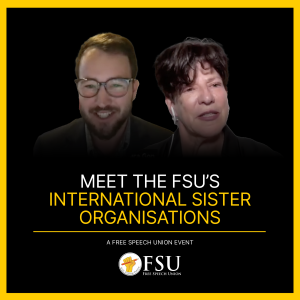
Wednesday Jun 07, 2023
Wednesday Jun 07, 2023
Toby Young hosts the directors of FSU New Zealand and FSU South Africa
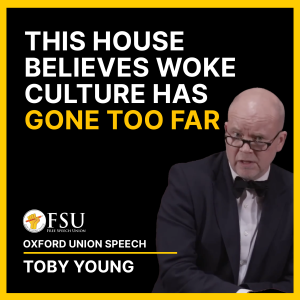
Wednesday Jun 07, 2023
Wednesday Jun 07, 2023
Toby Young puts forward the position that "woke culture" has gone too far.
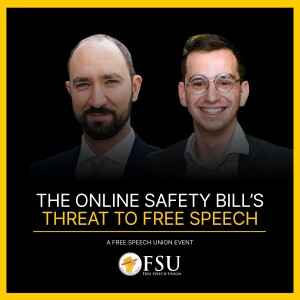
Wednesday Jun 07, 2023
Wednesday Jun 07, 2023
A must watch discussion on implications of this highly controversial Government bill
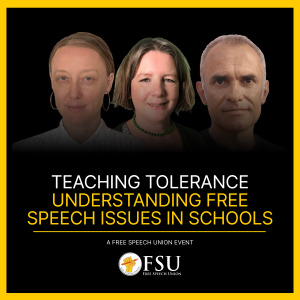
Wednesday Jun 07, 2023
Wednesday Jun 07, 2023
This deep dive discussion raises the question of whether freedom of speech applies in relation to schools.
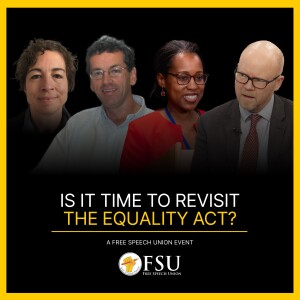
Wednesday Jun 07, 2023
Wednesday Jun 07, 2023
Dr Anna Loutfi joins us to discuss to case for re-visiting the equality act





